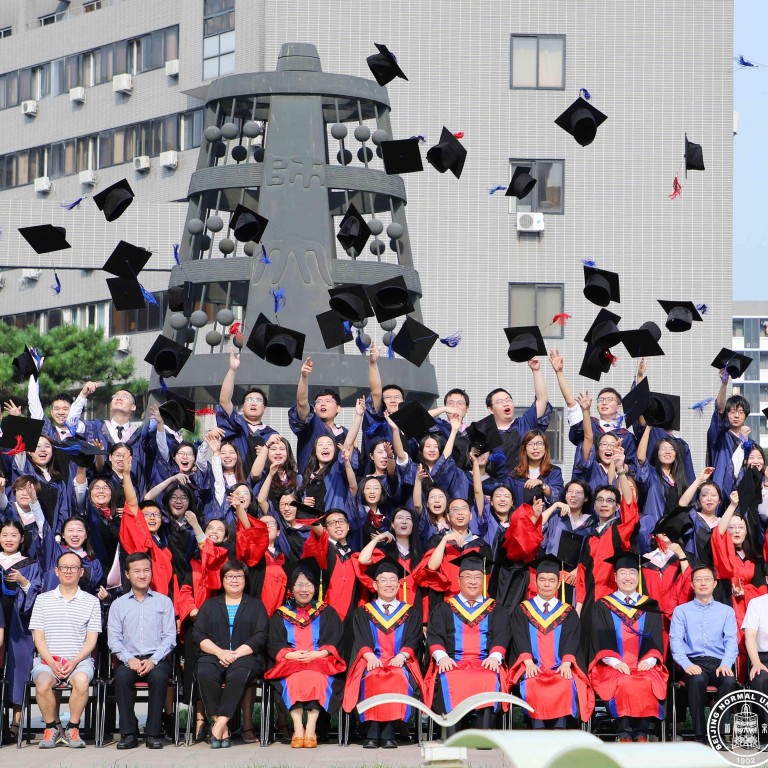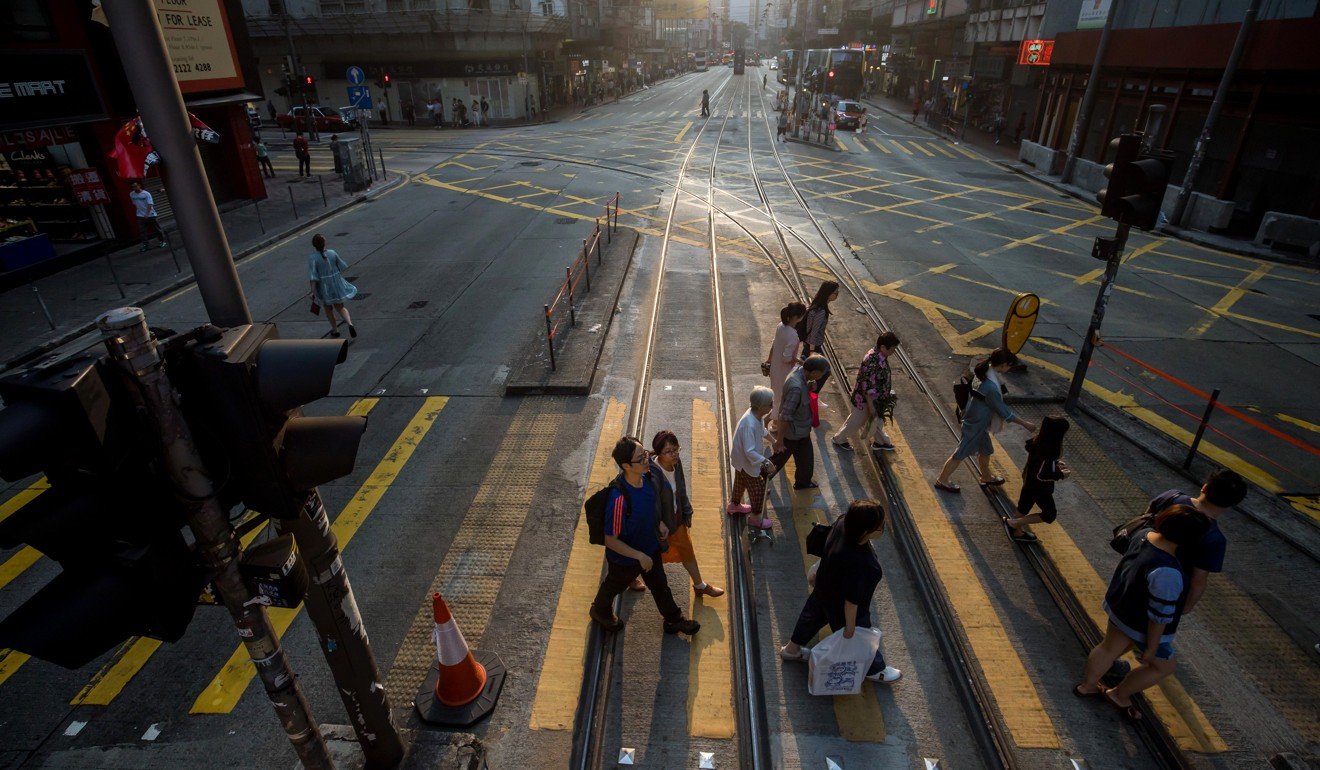
Positions vacant: China opens civil service jobs to Hong Kong and Macau residents for first time
- Guangdong says it has set aside 26 of 3,115 vacancies for graduates from special administrative regions
- Businessman welcomes move but says interest may be limited because young Hongkongers lack experience of mainland
The Guangdong provincial government said on Monday that 26 out of 3,115 new civil service vacancies had been set aside for applicants from Hong Kong and Macau.
Only applicants who expected to graduate from mainland universities in 2020 would be eligible, with 35 the maximum age for bachelor’s degree holders and 40 the cut-off for doctoral graduates.
The announcement follows the release in February of a blueprint for the Greater Bay Area – the integration of the two special administrative regions and nine Guangdong cities into a business hub that would rival California’s Silicon Valley by 2035.
The blueprint called on Hong Kong’s young entrepreneurs to explore opportunities on the mainland, and suggested that Hongkongers might be allowed to join the civil service and the city’s qualified teachers might be able to work in mainland schools.
The Guangdong job listings included vacancies ranging from village-level administrative positions up to provincial government jobs, with three vacancies at the provincial level in addition to five based in Guangzhou, four in Shenzhen, and two each in Dongguan, Foshan, Jiangmen, Huizhou, Zhaoqing, Zhongshan and Zhuhai.
About one-third required expertise in economics and finance.
Applicants for a position at the research office of the Shenzhen Communist Party Committee will need to have a doctorate in economics or ideology, according to the job description.
Applicants should also be “Chinese citizens who are Hong Kong or Macau residents; should uphold the Chinese constitution; should support the leadership of the Chinese Communist Party and Chinese socialist system; should safeguard the unity, security, honour and rights of the motherland; should embrace good political and moral qualities; and should bring outstanding academic achievements”.
Beijing gives Greater Bay Area fresh push as Hong Kong leader Carrie Lam reveals 16 new measures including easing of restrictions on buying homes and school enrolment
The announcement comes as Hong Kong struggles to end months of street protests triggered by a now withdrawn extradition bill in its biggest political crisis since the city’s return to Chinese sovereignty in 1997.
The increasingly violent unrest has strained Hong Kong-mainland ties and created an atmosphere of growing mistrust across the border.

Businessman Eric Yeung Chuen-sing, chairman of the pro-Beijing Hong Kong United Youth Association, said the new recruitment policy was only a first step towards integration.
“The policy actually came sooner than I expected, because the blueprint was only officially introduced in February,” Yeung said. “This is very positive anyway, and it shows that the long-term plans for further integration of Hong Kong and the mainland have not been disrupted by protests.”
Nelson Lee Ka-kiu, a political scientist at the Chinese University of Hong Kong, said he doubted that the new policy was a response to the unrest, suggesting Guangdong was simply implementing national policy.
“The Chinese government would see this as offering some benefits to Hongkongers,” Lee said. “But in reality, it is very unlikely that mainstream young Hongkongers would be interested in joining the civil service on the mainland because of our different work culture and issues like salaries.”
Hong Kong ‘protests highlight need for new role’ for city’s in China’s Greater Bay Area plan
Guangdong was also unlikely to be able attract top Hong Kong talent, he said. “Instead, this may be more attractive to those who may find it challenging to get a job in the city [Hong Kong] or elsewhere.”
Lee said that given the political climate, Beijing would give priority to applicants considered “loyal” to the central government. Hong Kong graduates of mainland universities would be regarded as better choices and it would be easier to do background checks on them.
Yeung said it was understandable that the positions were only open to graduates from mainland universities.
“Trying to recruit a Hong Kong person who has no experience of living or working on the mainland would be unrealistic at this stage,” he said.

A final year undergraduate from Hong Kong who is studying in Beijing said she would meet the basic civil service requirements but the jobs were not attractive.
“If I wanted to be a civil servant, I would still prefer working for the Hong Kong government,” the student said. “My family is in Hong Kong, and the salary won’t be as high as that available in Hong Kong anyway.”
She said that most of her friends who stayed on the mainland after graduation would choose business careers or to start their own companies.
A Guangdong provincial government official said salaries for civil servants were rising, and that Hongkongers who joined could expect starting salaries at around 10,000 yuan (US$1,428) per month before tax.
Hong Kong graduates of mainland universities are flocking to the Greater Bay Area – with 60 per cent working there or planning to
In Hong Kong, the median monthly starting salary for university graduates was HK$14,395 (US$1,839) last year, a study of official data by public policy group New Century Forum showed.
“This [recruitment] policy could also nurture party cadres for government work in Hong Kong and the region, [and this is] apparently a requirement of long-term planning,” the official said.
Emily, a Hongkonger and a 2018 graduate from Beijing Normal University, said she thought the government jobs would appeal to graduates with political ambitions.
“I have no interest of becoming a civil servant or a Communist Party member, but I can see why this would be appealing for people who have connections in the [mainland] government, or mainland-born people who have acquired Hong Kong residency but still want to live in China,” she said.

